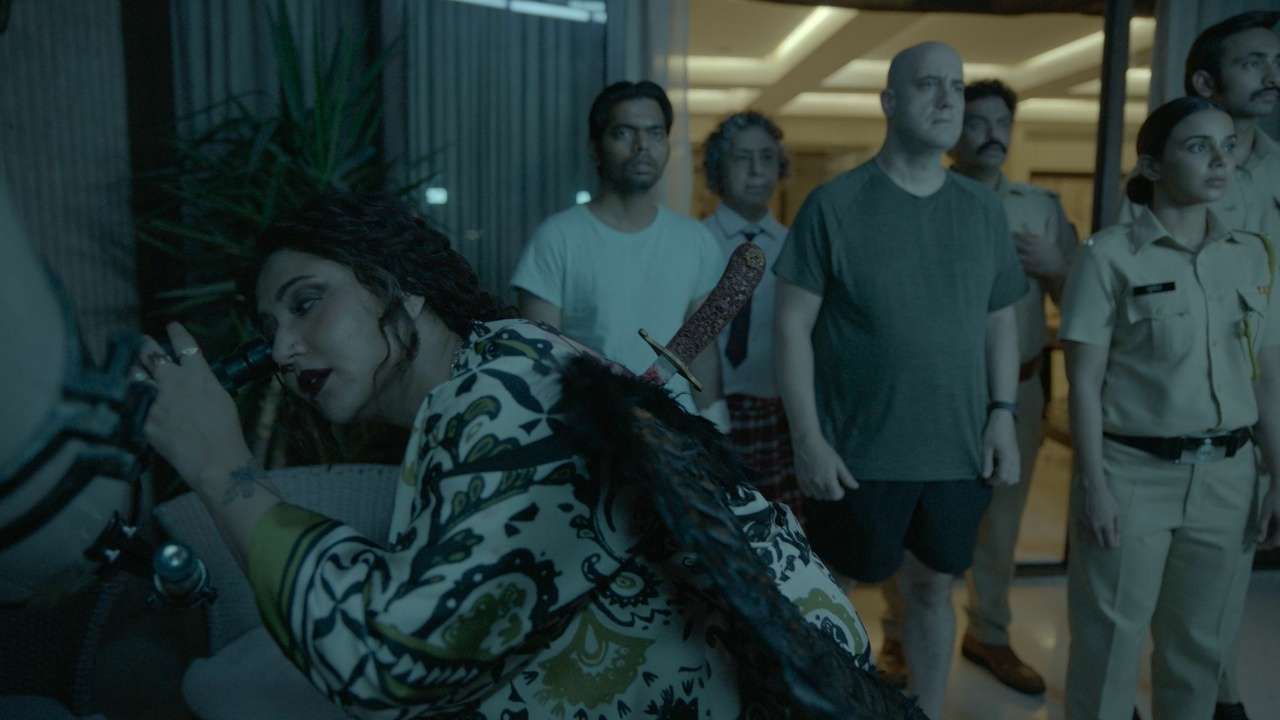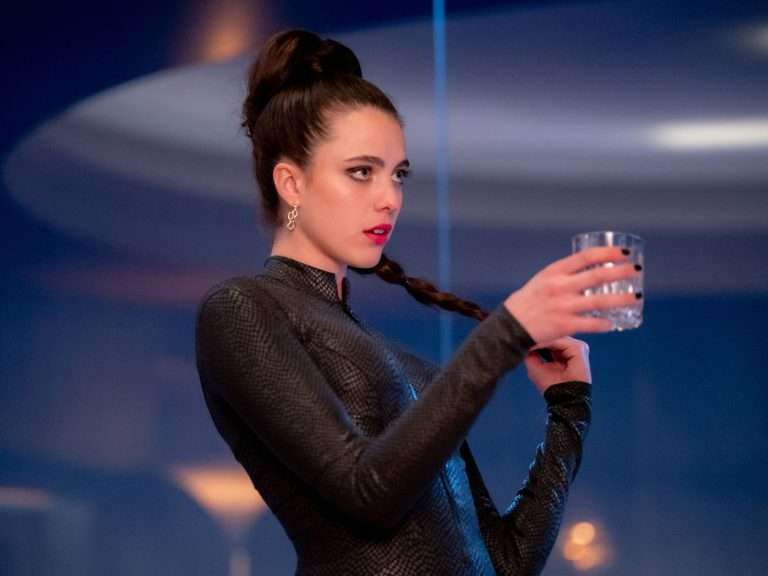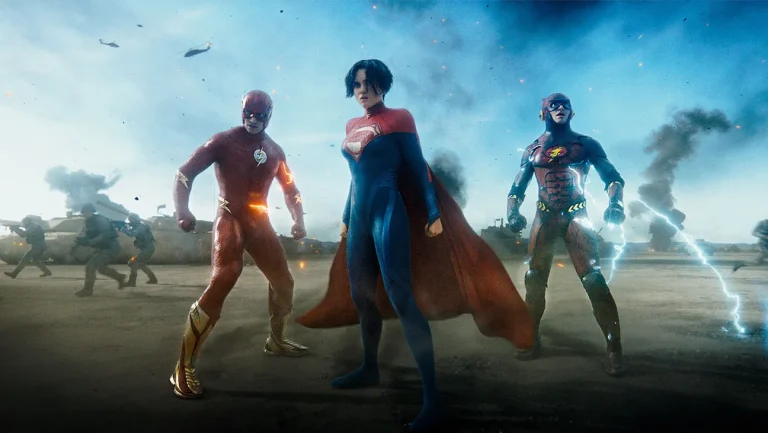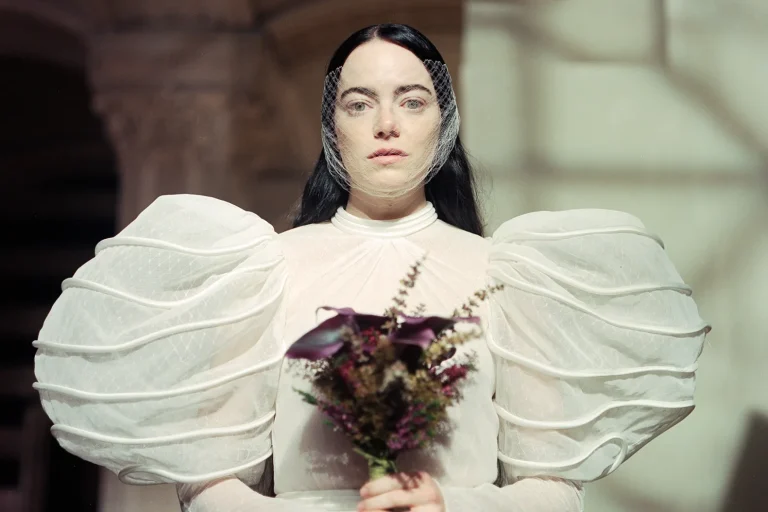Pratul Gaikwad’s “Dead Dead Full Dead” takes wackiness to the full hilt. It takes demented big swings, almost entirely heedless to whether it can land or not, delivering many a jolt to complacent, blasé audience expectations. There’s this spectacular, juddering fit of wishfulness that runs throughout the film, frequently pushing it toward unpredictable directions. The recklessness that characterizes the film may not always reap dividends. It can even be more exasperating than wickedly inventive, but the desire to take such audacious leaps is gratifying and thrilling, to say the least.
Balraam (Yug Italiya), a police constable, is thrown into a quandary when the goat his boss, Patil (Abhijeet Chavan), asked him to look after dies or, rather strangely, turns into a toy. Patil intended to gift it to his wife, with whom he had hit a rough patch. Zubeida ( Monica Chaudhary), also a constable and Balraam’s girlfriend, is sucked into the mess of how to best and most persuasively manage a cover-up of the dead goat. This couple is going through a misunderstanding of sorts. He is particularly pissed off at her even as she reassures him. But he refuses to be pacified. Their tiff is interrupted by a distress call.
An old woman, Mrs. Basanti (Flora Jacob), claims she witnessed a murder next door at her neighbor’s apartment. Taking her word for it, the cops enter the flat where the murder is supposed to have happened and stumble across a body on the floor knifed from behind. While the scene would naturally call for a certain soberness, there’s instead more levity or lightness in the manner the officers handle the situation. The dead woman, Era’s (Swastika Mukherjee) husband, Rahul (Ashvin Mushran), is in a hurry to get to his cricket match. Balraam is oddly apologetic in following the bare necessities of protocol, nearly content to let a potential suspect easily whisk off.
There’s also the couple’s house help, Chotu (Sachin Vidrohi), who constantly acts weird. But he is most dutifully mindful, set on the last task Era had asked him to do before her death. An eclipse was on the cusp, and she was excited and eager about it. On her instruction, he is decking up the apartment with balloons. There’s also an abrupt cutaway to a galactic station, which serves as the transit point for a soul to move across lifetimes. Era waits for the documents relating to her soul transfer to be done with.

Era’s spirit pops up throughout the course of the film, ticking everyone off. Mukherjee clearly seems to have had a ball playing the character. Era is a passionate reel-maker with a fixation on astrological hokum. She is irate, snappy, and suffers no fools, while her own shallowness couldn’t be more overt. Some of the glimpses we get at her reels are absolutely hilarious. Mukherjee utterly commits to Era’s cranky, controlling tendencies, her resolute annoyance with the mess of others, as well as whiffs of melancholy over a relationship not having blossomed in the way she’d have liked.
Gaikwad punctuates the film with a bundle of recurring conceits. The most striking of them has to be the one that allows the cops to slip into the flashbacks of all the players involved in the mystery. Both Balraam and Zubeida get their turns in inhabiting the reality alleged by the suspects on the day of Era’s reported murder. At one point, Balraam gets so engrossed in Rahul’s knack of sending burning paper planes spinning out the window that he, too, tries his hand at it. This edge of childish playfulness animates the entire film. Mrs. Basanti slinks into a school dress before going to sleep. She insists to a bewildered Balraam that it helps her keep persistent anxieties of failing an exam from her childhood days at bay.
Just the unadulterated lunacy of this film, the no-holds-barred abandon in Gaikwad’s imagination, make you instinctively root for this artist who is simply unafraid to punch out of the box of storytelling that trades in conventional associations and dulled palates. Gaikwad fully leans into and embraces the genre bent of the narrative to often unabashedly delightful ends. The screenplay, which Gaikwad has co-written with Abdul Aziz, is lively in pulling off subversions and surprises. The two investigating constables veer close to being absolute dunderheads. While Balraam certainly lacks the most basic intelligence, Zubeida has to keep an eye on her thieving habits. She can’t help but pick up and try on Era’s jewelry, makeup, and dresses. It doesn’t help that she’s a terrible liar.
Balraam’s absurdly low-barometer nature of deducing lends itself to ample chuckles. We are also told this is the first time these cops have found themselves having to take charge of a murder investigation. However, Balraam is confident that he can solve the case. Gaikwad sets up such a story and a tone where reveling in its inherent ridiculousness is essential for it to fly high and chaotically. Few of the film’s wild impulses and some of its off-kilter mood are offset at times by the dialogues that occasionally swerve to being a prosaic litany, especially Era’s, but Mukherjee salvages them with an attitude of casually bolting through the circumstances. “Dead Dead Full Dead” is a debut spilling over with rambunctious mischief.







![Demolition Girl [2019]: ‘Japan Cuts’ Review- A Soul-Crushing Coming-of-age Drama](https://79468c92.delivery.rocketcdn.me/wp-content/uploads/2019/08/D-Girl-1-548x365.jpg)
